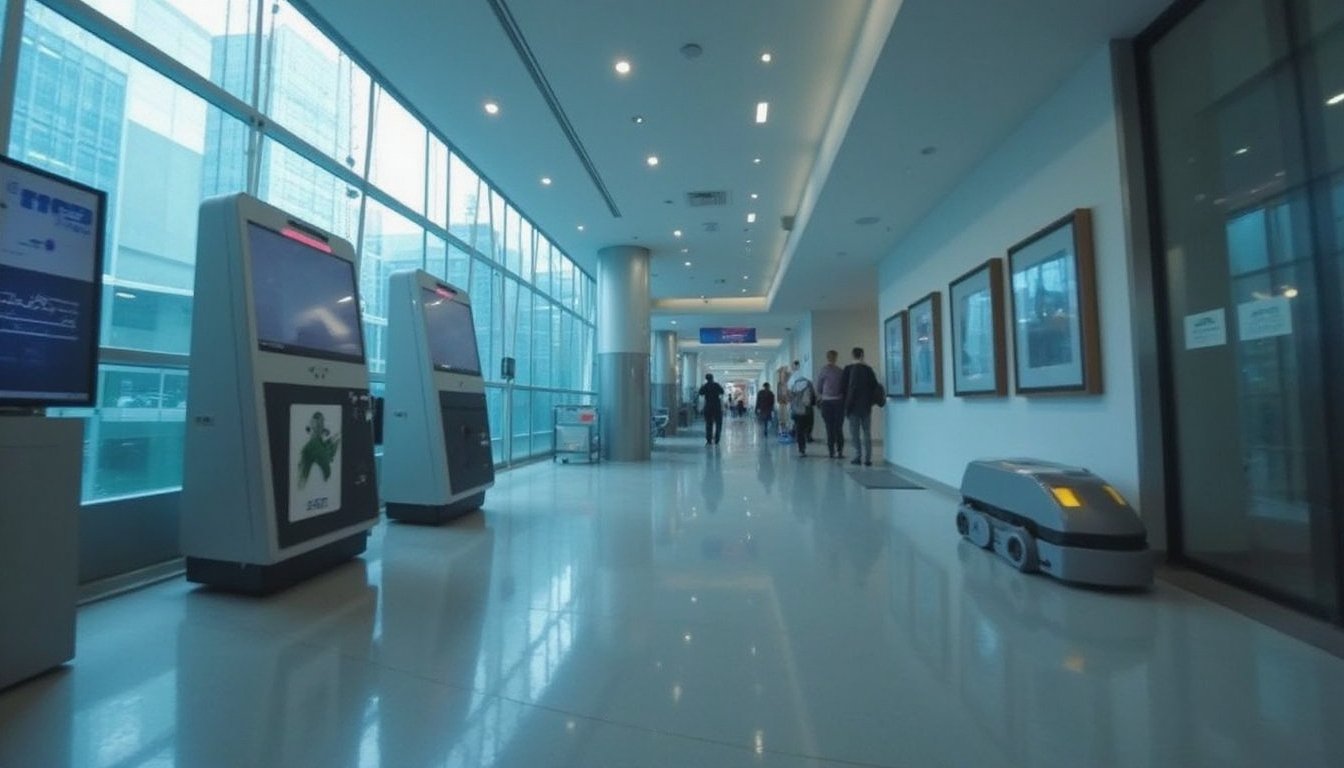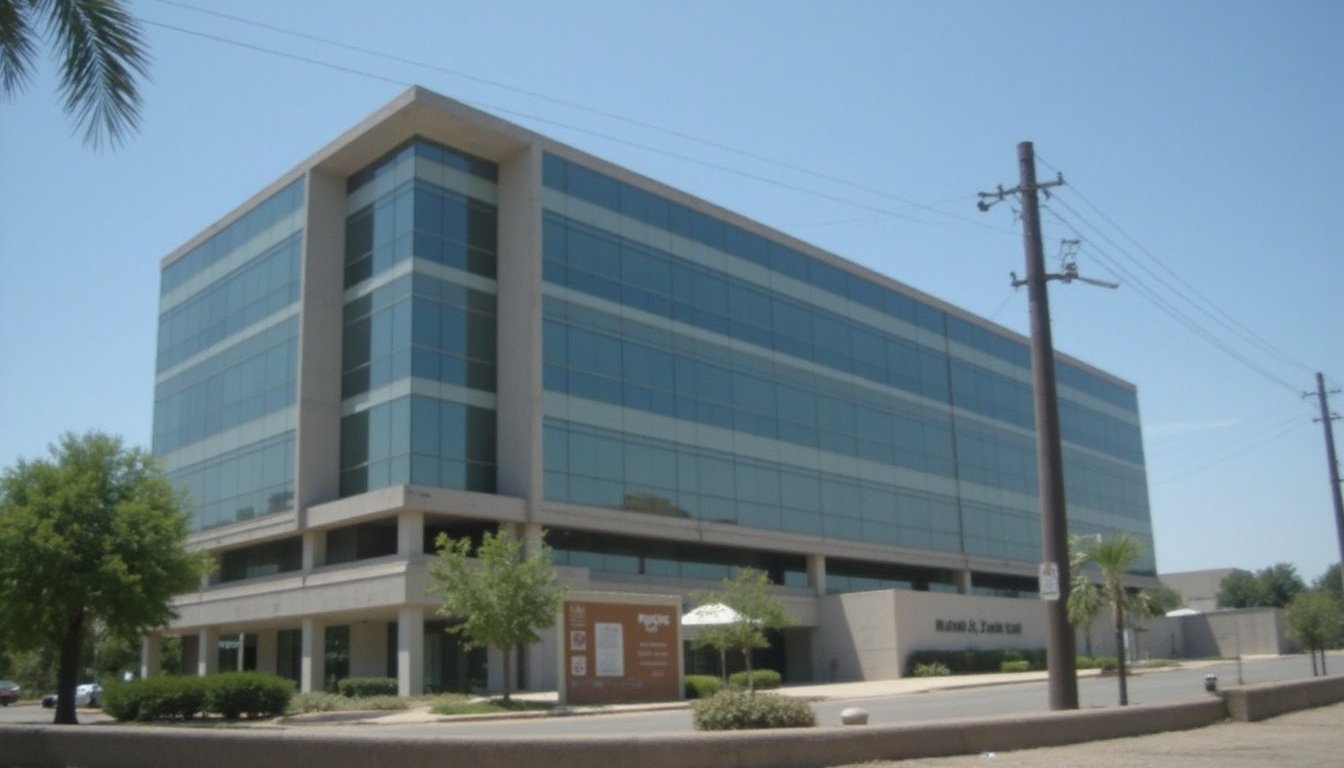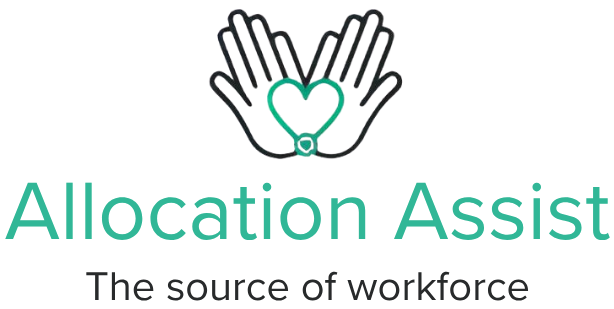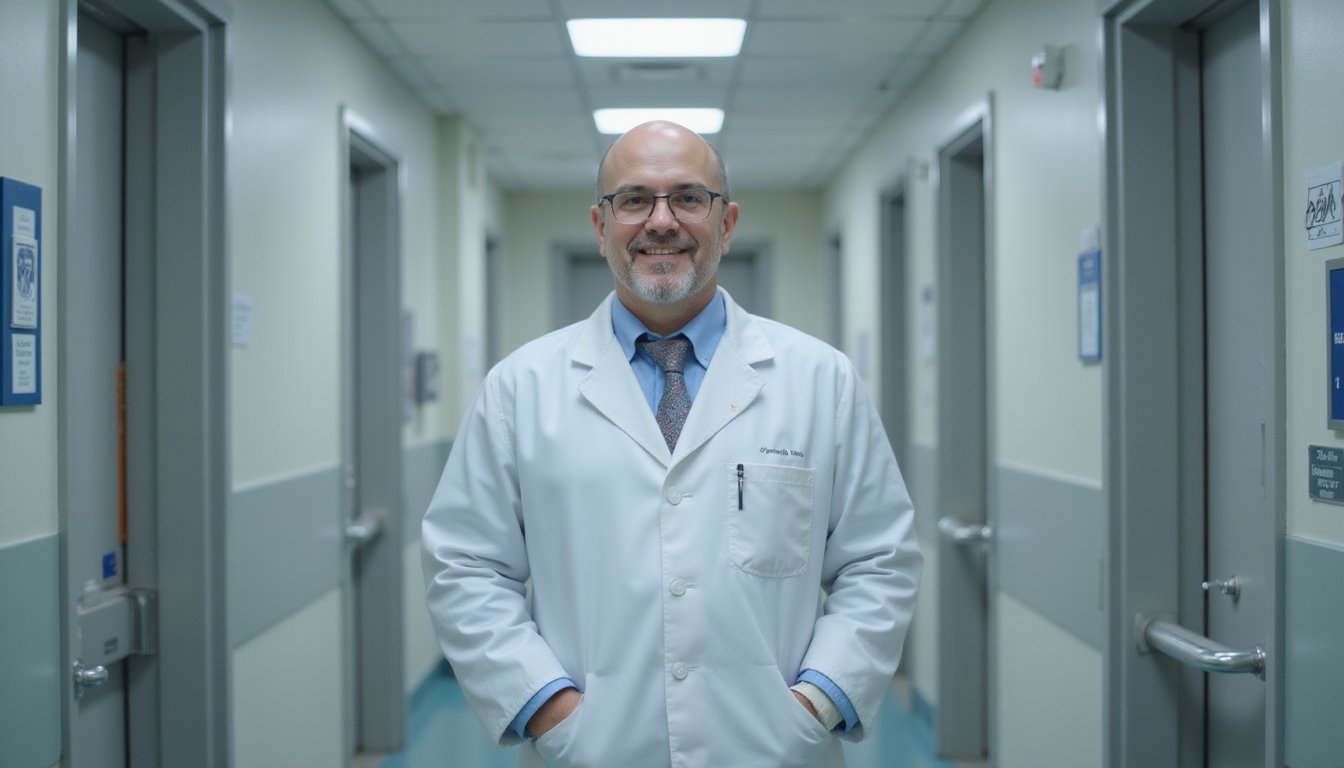Dubai’s healthcare sector offers you remarkable growth potential in 2025, driven by AI-powered diagnostics and precision medicine. You’ll find opportunities in the pharmaceutical market’s USD 5 billion projection and the medical device sector’s AED 5.6 billion forecast. The industry’s 9.5% annual expansion, coupled with a booming medical tourism market reaching USD 722.5 million, creates diverse investment pathways. Digital transformation and home healthcare’s surge to USD 967.6 million by 2030 signal extensive opportunities ahead.
Digital Healthcare Revolution and AI Integration

How is Dubai reshaping its healthcare terrain? Through a massive digital transformation anchored by AI-driven diagnostics and precision medicine initiatives. You’ll find major hospitals deploying machine learning systems that augment radiology and pathology capabilities, as demonstrated at WHX Tech 2025. Healthcare professionals are noting that data-driven insights significantly enhance their clinical decision-making processes.
The integration of predictive analytics is revolutionizing patient care by enabling personalized treatment plans based on real-time data analysis. You’re seeing healthcare facilities harness IoT devices for proactive monitoring and early intervention, particularly in chronic disease management. The Dubai Health Authority’s Smart Health Strategy is accelerating this transformation across the emirate’s healthcare ecosystem. This digital ecosystem allows for continuous improvement of care outcomes through data-driven decision-making.
The transformation extends beyond clinical applications; smart hospital initiatives are automating administrative workflows and optimizing resource allocation, positioning Dubai at the forefront of healthcare innovation in the MENA region.
Investment Landscape and Economic Growth Prospects
A remarkable investment surge is reshaping Dubai’s healthcare environment, with the sector drawing substantial capital across pharmaceuticals, medical devices, and infrastructure development. You’ll find significant growth potential in the pharmaceutical market, projected to exceed USD 5 billion by 2025, while the medical device sector‘s expected to reach AED 5.6 billion. Strategic focus on specialized care centers aligns with DHA’s investment priorities to address service gaps in the region.
Rising foreign direct investment continues to flow as Dubai targets US$2.5 billion in pharmaceutical R&D and manufacturing. Sovereign wealth fund investments are driving both domestic and international healthcare expansion, supported by over 150 hospitals and 5,000+ healthcare facilities across the UAE. The digital health solutions ecosystem is rapidly expanding with government support for telemedicine platforms and smart healthcare initiatives. The sector’s attractiveness is amplified by strong economic fundamentals, including high healthcare spending per capita at US$1,200 and annual revenues surpassing US$4.6 billion, making Dubai a prime destination for healthcare investments. With 75 insurance providers offering comprehensive coverage options, the market demonstrates robust infrastructure for sustainable healthcare delivery.
Medical Tourism Excellence and Market Leadership

While global medical tourism continues evolving, Dubai has emerged as a powerhouse destination, generating AED 2.3 billion in indirect revenue from health travelers in 2023. With 16.79 million visitors recorded through November 2024, the medical tourism sector continues to benefit from this robust influx of international travelers. The emergence of personalized care plans has revolutionized patient experiences, aligning with global trends in medical tourism excellence. The city attracted over 691,000 international health tourists seeking world-class treatments in 2023. You’ll find specialized treatments and elective procedure volumes growing rapidly, with the UAE medical tourism market reaching USD 722.5 million in 2024 and projecting a 19.84% CAGR through 2033.
| Segment | Market Share | Key Drivers |
|---|---|---|
| Asian Tourists | 33% | Advanced diagnostics |
| GCC/Arab | 28% | Cost efficiency |
| Europe/CIS | 23% | Luxury facilities |
| Women Patients | 58% | Specialized care |
| Top Specialties | High demand | Orthopedics, cardiology |
The city’s ambitious target of attracting 500,000 medical tourists by 2030 underscores its commitment to excellence. With state-of-the-art facilities, AI-driven diagnostics, and all-encompassing service bundles through Dubai Health Experience (DXH), you’re witnessing a transformation in healthcare delivery standards.
Home Healthcare Services Expansion
With Dubai’s home healthcare market set to reach USD 967.6 million by 2030, you’ll find digital monitoring solutions becoming increasingly central to care delivery models. You’re witnessing a significant surge in demand for skilled care workers as the sector expands at a 7.8% CAGR through 2030, driven by mandatory health insurance rollouts and an aging population. You’ll need to ponder how telemedicine and remote monitoring technologies are reshaping home healthcare delivery, particularly as post-Covid preferences continue to favor in-home care services. The rising demand for specialized care has created a critical need for long-term care beds across Dubai’s healthcare system. The UAE healthcare industry demonstrates remarkable growth potential with a projected 11.00% CAGR through 2030, signaling robust opportunities for healthcare providers and investors.
Digital Monitoring Solutions Growing
Dubai’s digital health monitoring market continues to outpace regional benchmarks, evidenced by a projected 78% remote monitoring adoption rate by 2025, significantly higher than the 51% regional average. You’ll find AI-powered platforms revolutionizing chronic disease management through remote deterioration alerts, achieving 92% diagnostic accuracy in home settings. Recent data shows over 65% of seniors are choosing home-based healthcare services over traditional clinical visits, highlighting the growing acceptance of digital care solutions. The implementation of AI-powered smart auditing systems has enhanced secure data exchange and patient privacy protection.
The sector’s growth is substantial, with the UAE’s home healthcare market expected to reach USD 1.98 billion by 2030, growing at an 11% CAGR. Dubai alone will contribute over USD 400 million to this value. You’re seeing transformative results, including a 40% reduction in diagnostic errors through blockchain integration and 50% shorter wait times via AI analytics. With 95% digital literacy among healthcare providers and triple the licensing requests for home care services, Dubai’s positioning as the Gulf region’s digital health leader continues to strengthen.
Care Worker Demand Surges
Three key factors are driving an unprecedented surge in UAE’s home healthcare workforce demands: mandatory health insurance expansion covering 3 million new workers, standardized emirates-wide care benefits, and a dramatic rise in senior care preferences.
The rapid market expansion, projected to reach USD 1.98 billion by 2030, creates immediate opportunities across multiple specialties. Data shows licensing requests have tripled, particularly in Dubai’s growing home care sector.
- Multilingual care workforce needs expanding to serve diverse expatriate communities
- Strong demand for geriatric care rehabilitation specialists and physiotherapists
- Critical shortages in post-operative care and chronic disease management roles
- Round-the-clock nursing requirements driving full-time and part-time positions
You’ll find the most significant growth in Dubai and Abu Dhabi, where 65% of patients aged 60+ now prefer home-based healthcare services over traditional clinic visits.
Insurance Market Dynamics and Coverage Solutions

You’ll find Dubai’s health insurance premiums rising 10-15% in 2025, driven by medical inflation and heightened claims volumes, while annual employer costs per employee reach USD 1,420, 38% above other emirates. Digital insurance platforms are revolutionizing policy accessibility and claims processing, with the number of providers increasing 35% since 2020 to reach 62 insurers. International providers now control 61% of Dubai’s market share, offering expanded cross-border coverage options and customized corporate plans that generate over USD 2.3 billion annually at an 18.5% growth rate. The growth trajectory is further supported by mandatory insurance laws requiring employers to provide comprehensive health coverage for their workforce.
Competitive Premium Rate Trends
The health insurance scenery in Dubai showcases significant premium adjustments, with rates climbing 10-20% for 2025 across most coverage tiers. You’ll notice personalized plan pricing shifts as 75% of insurers adapt to new regulatory mandates and evolving consumer preferences. The withdrawal of pandemic-era discounts has prompted a return to standard pricing structures.
Key market trends to examine:
- Basic medical packages range from AED 500-1,500 annually, while premium plans reach AED 10,000-20,000
- Private medical coverage costs USD 816-1,089 for individuals and USD 1,905-2,722 for families
- Co-payment structures include 20% for inpatient care (capped at AED 500/visit)
- New mandatory coverage includes organ transplants, dialysis, and mental health services
Digital Insurance Platform Growth
Beyond shifting premium rates, Dubai’s digital insurance terrain has fundamentally transformed how providers connect with customers. Digital platform benefits have catalyzed market expansion, with the sector projected to reach USD 14.9B by 2033, growing at 6.1% CAGR. You’ll find user experience upgrades driving adoption across all segments.
| Platform Feature | Market Impact | 2025 Outlook |
|---|---|---|
| AI Integration | Enhanced Risk Assessment | 20% Growth |
| Digital Claims | Faster Processing | 15% Adoption |
| Mobile Apps | 24/7 Access | 30% Usage |
The DIFC’s inclusion of 1,081 new insurance-related firms in H1 2025 demonstrates the sector’s digital transformation momentum. You’re witnessing a surge in InsurTech partnerships, with providers leveraging automation, blockchain, and data analytics to deliver streamlined solutions that meet Dubai’s increasingly sophisticated insurance needs.
Cross-Border Coverage Expansion
Dubai’s cross-border insurance terrain stands poised for significant transformation, driven by a growing expatriate population that comprises over 80% of UAE residents. The market’s evolution centers on employer-based compliance and cross-border expatriate solutions, with projections indicating a robust CAGR of 6.1% through 2033, reaching USD 14.9 billion.
- Mandatory employer coverage dominates group insurance, extending to dependents and supporting elaborate family networks
- Customized solutions for SMEs and low-income segments are emerging, particularly in Northern Emirates
- Both public and private insurers are expanding cross-border solutions, with public providers growing at 8.9% CAGR
- Standardized national packages starting at AED 320 annually have eliminated chronic disease waiting periods
You’ll find the market responding to these dynamics through novel product layering and personalized coverage options, ensuring sustained growth in Dubai’s healthcare insurance sector.
Infrastructure Development and Modernization
While transforming its healthcare milieu through unprecedented expansion, Dubai has committed AED 118 billion in the direction of modernizing its medical infrastructure by 2027. You’ll see this investment materialize through 3 new hospitals and 33 primary healthcare centers by 2033, with sustainable building design and green energy integration at their core.
The modernization extends beyond physical structures. You’re looking at AI-driven facilities that cut diagnostic errors by 40% and slash treatment wait times by 50%. The infrastructure roadmap prioritizes underserved areas like Al Yalayis and Al Awir, while introducing specialized centers of excellence across Dubai. Smart health auditing systems, powered by AI, guarantee facility compliance and engineering efficiency, while blockchain technology secures patient data and streamlines health information management.
Public-Private Partnership Opportunities
Private-sector partnerships have emerged as catalysts for Dubai’s healthcare transformation, with investments reaching unprecedented levels as the market expands at 9.5% annually. Through targeted incentives and public land allocation, Dubai’s healthcare sector now offers compelling opportunities for international providers looking to establish a regional presence.
- PPP frameworks will develop three new hospitals and 33 primary care centers by 2033, with AED 15 billion committed for specialized facilities
- Revenue-sharing models offer up to 50% returns on AI-driven solutions across 300+ facilities
- Joint facility management structures utilize AED 30 billion in smart health technology integration
- Risk-sharing arrangements include operational management and performance metrics, providing stable returns
The medical tourism market‘s projected growth to USD 2.3 billion by 2033 further strengthens the investment case for international healthcare operators seeking expansion.
Regulatory Framework and Market Stability
Building on the momentum of private partnerships, a sturdy regulatory framework now supports Dubai’s healthcare market stability. Law No. (5) of 2025 establishes extensive public health measures, while Federal Law No. 6 of 2023 enforces strict licensing standards across the sector.
You’ll find substantial health data governance structures in place, with DHA’s policies mandating stringent privacy controls and cybersecurity measures. The market’s stability is further reinforced by mandatory health insurance requirements linking coverage to residency status. Healthcare organizations can now investigate regulatory sandboxes while adhering to international standards and digital health initiatives.
For investors and practitioners, the framework offers clear operational guidelines with defined penalties for non-compliance, ranging from AED 500,000 for individuals to AED 1,000,000 for organizations, ensuring market integrity and patient safety.
Frequently Asked Questions
What Qualifications Are Required for International Healthcare Professionals to Practice in Dubai?
You’ll need a bachelor’s degree in your healthcare field with credential validation from UAE authorities. You must pass the DHA exam through Prometric and obtain professional accreditation via the Sheryan Portal. You’re required to have at least 2 years of post-qualification experience, with no career gaps exceeding 2 years. You’ll also need to submit translated qualification certificates, a Good Standing Certificate, and meet specialty-specific certification requirements.
How Do Seasonal Weather Conditions Impact Medical Tourism Patterns in Dubai?
You’ll find Dubai’s medical tourism peaks during November-March when cooler seasonal weather patterns attract international patients. You can expect a 15-20% increase in clinic appointments during these months, while summer’s extreme temperatures (40°C+) typically reduce visitor numbers. Tourist health concerns about heat exposure influence treatment timing, particularly for outdoor recovery periods. You’ll notice Northern and European patients strongly prefer winter visits, while GCC nationals maintain more consistent year-round demand.
What Are the Specific Licensing Requirements for Starting a Healthcare Facility?
You’ll need to meet several key licensing requirements to start a healthcare facility in Dubai. You must appoint a licensed Medical Director and secure DHA approval. If you’re a foreign investor, you can own the facility but must partner with qualified medical professionals. You’ll have to submit detailed business plans, obtain a trade license, and guarantee NABIDH compliance. Your facility must also pass strict infrastructure standards and DHA inspections before receiving operational approval.
Which Emerging Healthcare Specialties Have the Highest Demand-Supply Gap in Dubai?
You’ll find the biggest demand-supply gaps in mental health, genomics, and preventive care initiatives. Mental health specialists are critically undersupplied, with rising awareness driving unprecedented demand. Genomics and precision medicine experts can’t keep pace with Dubai’s expanding personalized healthcare sector. The city’s progression toward telehealth advancements has also created significant shortages in AI-driven diagnostics and digital health specialists, while lifestyle medicine physicians remain scarce despite growing preventive care needs.
How Does Dubai’s Healthcare Cost Structure Compare With Other Global Medical Hubs?
You’ll find Dubai’s healthcare costs generally lower than other global hubs like Singapore, London, and New York for initial consultations, but there’s less government subsidies to offset expenses. While basic insurance starts at just 320 AED annually, patient affordability remains challenging as out-of-pocket costs rise 3% yearly. Dubai’s private sector dominates (48% of spending) compared to peer cities, where public funding typically provides broader coverage and stronger cost controls.








